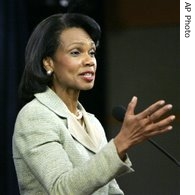2007年VOA标准英语-Rice: US-India Nuclear Deal Can be Complete by
搜索关注在线英语听力室公众号:tingroom,领取免费英语资料大礼包。
(单词翻译)
By David GollustState Department
27 June 2007
U.S. Secretary of State Condoleezza Rice said Wednesday she believes a U.S.-Indian nuclear cooperation deal can be completed by the end of the year. First proposed two years ago, the ground-breaking accord has been slowed by policy disputes. VOA's David Gollust reports from the State Department.
 |
| Condoleezza Rice, 18 Jun 2007 |
First proposed by the United States in July of 2005, the nuclear pact1 would allow India access to U.S. civilian2 nuclear technology, overturning a decades-old ban resulting from India's refusal to sign the Nuclear Non-Proliferation Treaty.
Under the deal intended as the cornerstone of a new U.S.-Indian partnership3, India is to separate its civilian and military nuclear facilities and allow an international inspection4 regime in return for nuclear technology and fuel supplies.
The sides finished a round of high-level talks in New Delhi earlier this month, with India resisting proposed terms that would limit its right to reprocess spent nuclear fuel and allow the United States to halt cooperation if India tested a nuclear weapon.
Addressing a meeting of the U.S.-India Business Council in Washington, Rice said if the process had been easy it would have been completed a long time ago. But she said she remains5 confident it eventually will be:
"I think that this is a win-win if ever there were one," she said. "And I know that it has broken some of the old taboos6 about how to deal with this problem. But I'm quite confident that if we keep after it, if we stay faithful to the agreements that our leaders signed, if we stay faithful to the legislation we have passed, we can work out the implementing7 agreement, we can get the approval of our Congress and ratification8 in India, and we can move forward."
Rice said the rest of the world is watching the nuclear talks, which she said, if successful, would put the United States and India on course to "a tremendous future," not just in the nuclear field, but others as well.
The Secretary also told the business group the two countries should do more to advance the Doha Development Round of World Trade Organization negotiations9.
The talks, which began in 2001, have been stalled over a divide between industrial nations and developing countries.
The latter, led by India and Brazil, criticize the United States for failing to offer deep enough cuts in farm subsidies10.
The United States and European Union, meanwhile, say the major developing states are refusing to offer new opportunities for their manufacturing exports.
Rice said the failure of the Doha talks would be a historic missed opportunity and a tragedy.




